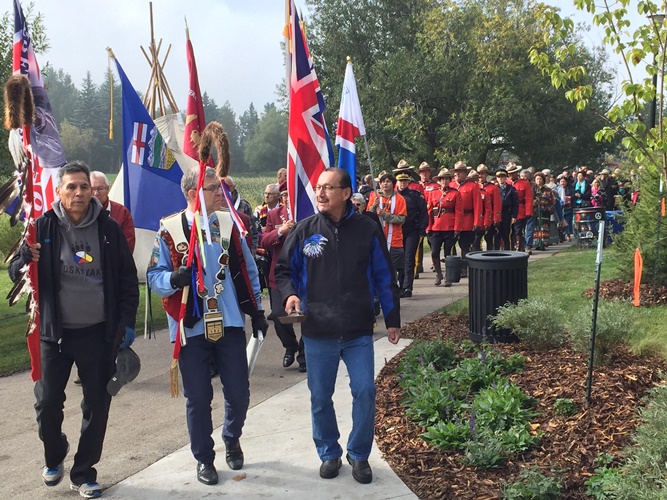(St. Albert) – A multi-faceted initiative, The St. Albert Healing Garden officially opened to the public on September 15 in a spiritual pipe ceremony and celebration. Now, as part of the community’s commitment to walk in right relations with First Nations, Métis and Inuit Peoples and with all Nations, organizers have released a poignant documentary that will serve as a vital teaching tool both locally and nationally.
“The City is very pleased and proud to be involved in this project and to support the Calls to Action identified by the Truth and Reconciliation Commission (TRC),” says City of St. Albert Cultural Services Director, Kelly Jerrott. The St. Albert Healing Garden, officially named Kâkesimokamik (Cree for ‘healing garden’), was the result of a collaborative initiative led by a planning committee made up of residential school survivors, representatives from the First Nations and Métis communities, United Church, Catholic Church, public and City of St. Albert – one of the first of its kind in Canada.
Released nationally to approximately 60 municipalities and provincial and federal government representatives at the Creative City Summit in Halifax, Nova Scotia on October 18-20, as well as privately to The St. Albert Healing Garden committee at City Hall on October 25, the documentary showcases the reasons behind the development of the therapeutic sanctuary. The idea to have a place of reflection, understanding and learning came from Rev. James Ravenscroft, a former United Church minister in St. Albert, following a conversation with Maggie Hodgson, a well-known and respected addictions program developer and counselor, women’s advocate and author.
In addition to the documentary, a resource now available for community use, plans are underway by the City to develop other initiatives with schools and local community organizations such as the Musée Héritage Museum and Michif Cultural Connections. “We’re taking the next steps to build and develop relationships with the Indigenous community, educate City Council, Administration and the public,” says Mayor Nolan Crouse.
Specifically, the City will move forward on the creation of an Indigenous Relations Advisory Committee to address the relevant TRC Calls to Action and provide advice to Council and Administration on matters of interest to Indigenous Peoples. An Indigenous Cultural Awareness Workshop with Council will also take place in 2018, and local Indigenous Elders will be consulted to develop an inclusive acknowledgement statement for civic events, ceremonies and functions.
St. Albert was home to two residential schools: St. Albert Indian Residential School (Youville, located on Mission Hill) and Edmonton Indian Residential School (Poundmaker, located about six km east of downtown St. Albert).
For more information on The St. Albert Healing Garden and to view the documentary, please visit stalbert.ca The Healing Garden.



Be the first to comment on "St. Albert Healing Garden: ‘We’re taking the next steps’"